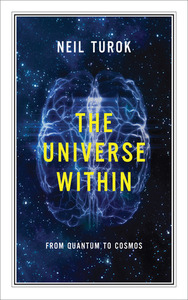Take a photo of a barcode or cover
Definitely a book the geek in me enjoyed. It accurately describes the reasons people get drawn into the world of physics and studying the universe. It makes you want to go out and discover the answers for yourself.
This was a fairly quick read, enjoyable as a refresher on modern physics and inspiring as a call to arms for more-- better!-- scientific discovery. I do feel as though the tone failed at times to toe the line between being layman-accessible and being fully explanatory. I was occasionally bored by what seemed to me to be over-explanations of simple classical physics, but otherwise occasionally overwhelmed by the complexity of string theory; being a scientist myself, I have a hard time watching details get glossed over. That said, it's hard to know the extent to which this issue was a result of some flaw in Turok's writing or editing, rather than simply the seriously challenging nature of the material. Simplification of string theory or M theory, for example, is no small feat. Moreover, I may not be the target audience for a book like this... I'm no physicist, but I know a little about a lot of scientific fields. I almost feel I should be reading less and less accessible books on these topics to satisfy my curiosity.
One further caveat on my enjoyment of this book: despite the title and the image of a human brain on the cover, there is nothing in here relating to neuroscience at all. That will teach me to judge a book by its cover...
One further caveat on my enjoyment of this book: despite the title and the image of a human brain on the cover, there is nothing in here relating to neuroscience at all. That will teach me to judge a book by its cover...
Very interesting and a bit mind expanding. Liked it a lot.
challenging
hopeful
informative
inspiring
medium-paced
Ah, science fact. Such a different kind of read from science fiction.
This author falls into the 'endlessly optimistic' camp. He picks out anecdotes from physics history to paint a picture of geniuses and collaborators being inspired and confounded by the mysteries of each age. Up-to-date as of last year, it is quite interesting for its view on modern advances in cosmology.
Good stuff, even though I disagree with some of his points (like how we're nearly done understanding the world. I have a feeling we're as certain and as wrong about that as we were 100 years ago at the advent of quantum physics.) and object to him using the first half of an otherwise-unrelated chapter to advertise his initiatives in Africa. It's important. It's science. It's showing results. But give it it's own chapter, don't shoe-horn it into 'The World in One Equation'. I wanted the equation and the story behind its creation.
This author falls into the 'endlessly optimistic' camp. He picks out anecdotes from physics history to paint a picture of geniuses and collaborators being inspired and confounded by the mysteries of each age. Up-to-date as of last year, it is quite interesting for its view on modern advances in cosmology.
Good stuff, even though I disagree with some of his points (like how we're nearly done understanding the world. I have a feeling we're as certain and as wrong about that as we were 100 years ago at the advent of quantum physics.) and object to him using the first half of an otherwise-unrelated chapter to advertise his initiatives in Africa. It's important. It's science. It's showing results. But give it it's own chapter, don't shoe-horn it into 'The World in One Equation'. I wanted the equation and the story behind its creation.
hopeful
informative
reflective
medium-paced
A hopeful and insightful book which gives some historical context and demonstrates links between the typical modules and subjects covered in a first year physics degree. I've been trying to 'remember the joy' of physics after my first year and this book has helped to remind me why I'm doing my degree at all.
"Merely to be alive, to experience and to appreciate the wonder of the universe, and to be able to share it with others, is a miracle."
this one isn't as advanced as a few popular science books I've already read so in the first couple chapter I was a little bored. however, turok posses an almost sagan-like optimism and passion for recruiting new minds to science. his belief that we can and will make the world a better place with science is truly charming. and of course, his glowing description of Canada sealed the deal for a four-star rating
informative
relaxing
medium-paced




